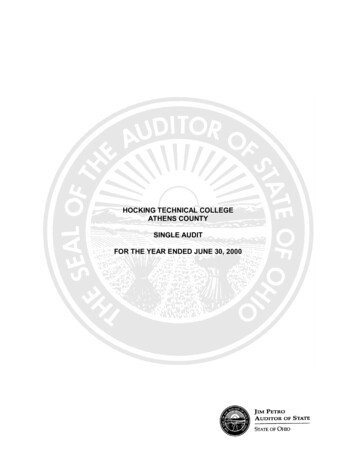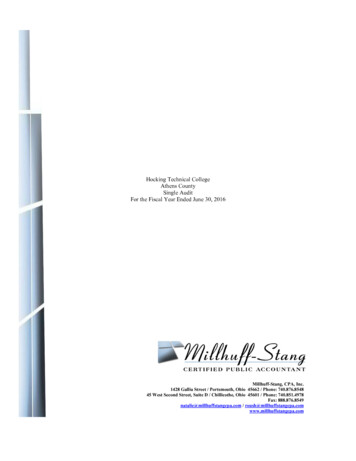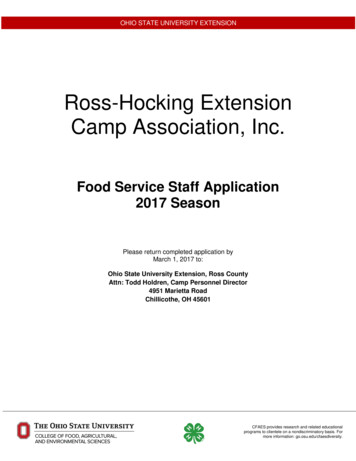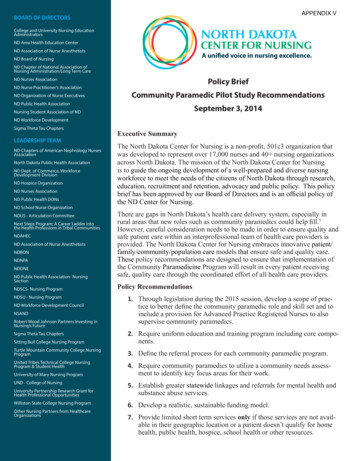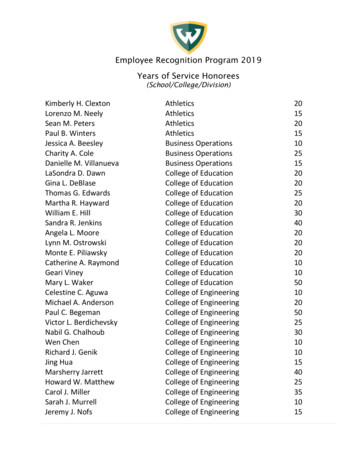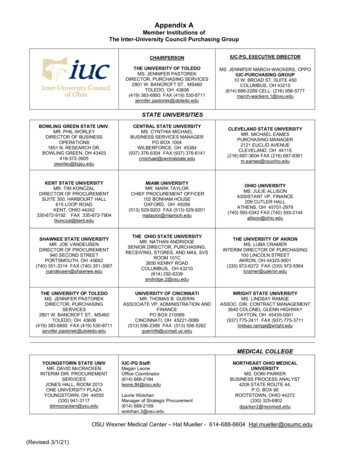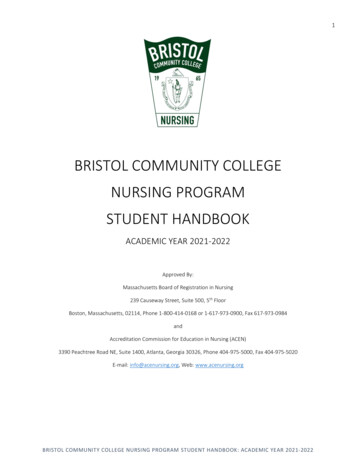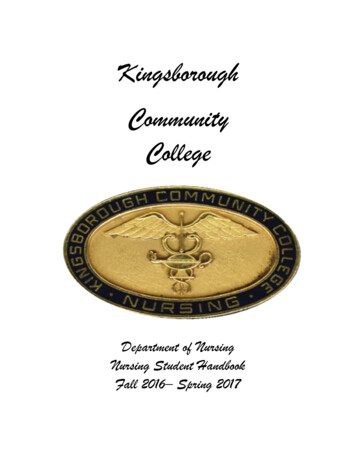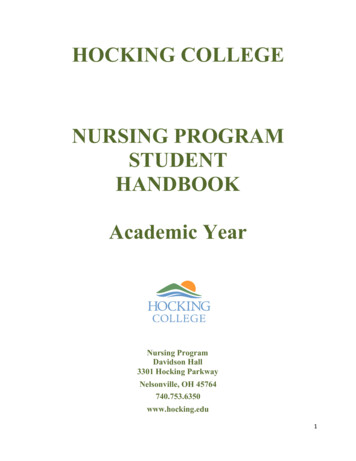
Transcription
HOCKING COLLEGENURSING PROGRAMSTUDENTHANDBOOKAcademic YearNursing ProgramDavidson Hall3301 Hocking ParkwayNelsonville, OH 45764740.753.6350www.hocking.edu1
TO:All Nursing StudentsFROM:The Nursing Faculty and StaffRE:Nursing Student HandbookWelcome to Hocking College and to the Nursing Program. This handbook is designed toprovide students with information about the nursing programs. It sets forth the policies andguidelines of the Nursing Division. The Nursing Division reserves the right to changepolicies and procedures without notice.Purpose of the handbook: To provide guidance for new and continuing students To describe general policies about the nursing programs To inform students of their rights and responsibilities as a nursing studentWe wish you academic success and look forward to welcoming you to the ever-growing alumnigroup of competent, caring and conscientious Hocking College Nursing graduates.The Hocking College Nursing Programs are:Approved by the Ohio Board of Nursing17 South High Street, Suite 400Columbus, Ohio 43215Phone: 614.466.3947www.state.oh.us/nurAccredited by the Accreditation Commission for Education in Nursing ( ACEN)3390 Peachtree Road NE, Suite 1400Atlanta, Georgia 30326Phone: 404. 975.5000Fax: 404. 975.5020http://www.acenursing.org/2
Table of ContentsHocking College Nursing ProgramINTRODUCTION5NURSING MISSION AND PHILOSOPHY-CONCEPTUAL FRAMEWORK6Philosophy7Conceptual Framework (Curriculum Threads and Strands)8Supporting Concepts13GENERAL POLICIES AND LEARNER RESPONSIBILITIES16Services for Learners17Learners with Disabilities18Children on Campus18Student Grievance Due Process Procedures18Grade Appeal Process18Student Board18THE NURSING PROGRAM20Course Prerequisites and Corequisites21Advanced (Non-Traditional) Course Credit21Attendance and Attendance Policy23Social Media Usage: Maintaining Privacy, Confidentiality and Professionalism25Definitions25Types of Social Media25Image of Nursing and Social Media25Privacy and Confidentiality25Consequences of Breaches26Examples of Confidentiality/Privacy Breaches26Benefits of Social Media27Examples of Benefits of Social Media27GRADING28Grading PN Students28Grading PN2RN and RN Students29Readmission for Out-of-Sequence Students30ACADEMIC STANDARDS32Nursing Department Policy Regarding Honesty33Student Conduct While Providing Nursing Care34Nursing Academic Probation/DismissalPN/RN373
Suspension from the Nursing Program37Probation and Academic Dismissal from Hocking College38Graduation Requirements39CLINICAL GUIDELINES40Uniform Dress Code41Maintenance of Good Health42Student Health Insurance Coverage44Student Liability Insurance44Grading Policy for Clinical Attendance45Adverse Weather Conditions/Clinical Cancellation46Information About Clinicals47Evaluation47Clinical Assignments48College and Affiliating Agency Guidelines49NEARING GRADUATION50Simulated State Board Exams51Licensure Application and Legal 52Graduation Application52POST GRADUATION FOLLOW-UP52PLACEMENT534
INTRODUCTION5
NURSING MISSION/PHILOSOPHY/CONCEPTUALFRAMEWORKThe nursing unit embodies the institutional mission, vision, and values with unique PN and RNprograms that are hands-on and learner-centered. The mission of the Nursing Program is tomeet the educational needs of individuals who wish to enter the nursing profession or to advancetheir nursing skills and to meet the health care needs of the extended community. The purposeof the Nursing Program is to help meet the health care needs of the extended community bypreparing competent, caring nursing graduates to enter practice as Licensed Practical Nurses andas Registered Nurses in a variety of health care delivery environments. A dual purpose of theprogram is to meet the educational needs of individuals who wish to enter the nursing programor to advance their nursing skills. Graduates of the Nursing Program will have the knowledgeto become safe entry-level practitioners for a diverse patient population.The Nursing Program seeks to fulfill its mission by focusing on the following major goals: To provide the learner with opportunities to acquire the knowledge and skillsnecessary to become a safe entry-level practitioner. To provide the learner with opportunities to develop an understanding ofhuman relationships. To encourage the learner to be a contributing, caring member of the health professionand society. To promote learning as a lifelong process. To promote the development of professional skills and attitudes. To prepare the graduate for licensure and practice as a Licensed Practical Nurse ora Registered Nurse. To facilitate education that will permit acceptance/transfer into a baccalaureatedegree nursing program. To integrate quality safety education nursing (QSEN) guidelines throughout thecurriculum. To maintain program approval by the Ohio Board of Nursing. To maintain accreditation from the Accreditation Commission for Education in Nursing(ACEN) for the Assoicate of Applied Science in Nursing.6
HOCKING COLLEGENURSING PROGRAMSPHILOSOPHY Each individual has innate worth as a unique living, feeling, thinking, social being whoexists in a dynamic interaction with self, society and the environment. While eachindividual is unique, each has holistic needs common to all including the need to attainan optimal level of health. Society is the collective human environment which is in dynamic interaction withthe individuals influencing the attitudes, beliefs, values, ideas and behaviors. Health is a dynamic process over the wellness–illness continuum involving holistic careneeds (biological, psychological, cognitive, sociocultural and spiritual) over the lifespan. Nursing is a caring interactive process of responding to the holistic dynamic healthneeds of individuals, groups, families and communities over the life span andwellness–illness continuum to help people achieve an optimal level of health. Education is a dynamic learning process based on sound teaching learning principles,outcomes and current evidence, structured from simple to complex, from familiar tounfamiliar influencing values, attitudes, knowledge and skills. In a learningpartnership, both teacher and student are accountable for optimizing educationalopportunities to achieve diverse personal and career goals. Nursing Education is responsive to the adult learner needs and career goals byproviding flexible opportunities for entry to and exit from the nursing program bybuilding on previous relevant experiences and knowledge to help students develop theessential values, attitudes, knowledge and skills for safe caring nursing practice.The scope of practice for the beginning practitioner who is a graduate of the PracticalNursing Program and of the Associate Degree Nursing Program is directed towardproviding and/or managing holistic compassionate nursing care for people with well-definedhealth problems (guided as needed by a more experienced nurse) as a member of the nursingprofession and of the interdisciplinary healthcare team.Philosophy Adopted 1987Last Reviewed and Accepted July 20197
CONCEPTUAL FRAMEWORK (CURRICULUM THREADS ANDSTRANDS)The faculty has identified the following concepts that are woven throughout both programs andthe PN2RN curriculum, offering structure as the conceptual framework for our curriculum:Major Concepts :Nursing ProcessClinical SkillsCommunication/Relational SkillsProfessionalismSupporting Concepts :Lifespan VariationsClinical Reasoning/JudgementTeaching/LearningManagement of CareDiversityWellness-IllnessContinuum Health andHuman Sciences HolismInherent within the nursing process are eight supporting concepts: lifespan variations, clinicalreasoning/judgement, teaching/learning, management of care, wellness-illness continuum,holism, diversity, and knowledge of human sciences. To effectively identify needs, establishpriorities, and plan care that will encourage the patient as he/she endeavors toward his/heroptimum level of wellness, the nurse must be knowledgeable in all of the supporting concepts inorder to safely and effectively implement the plan of care.8
Major Concepts : Nursing Process, Communication/Relational Skills, Clinical Skills, and ProfessionalismSupporting Concepts : Clinical Reasoning/Judgement, Lifespan Variations, Teaching/Learning, Management of Care, Diversity, Health and HumanSciences, Holism, and the Wellness-Illness Continuum. (Definitions for these concepts are attached.)Curriculum Threads/StrandsPN Program OutcomesRN Program OutcomesNursing ProcessNursing Process i s a scientific problem-solving toolWithin the scope of practical nursing andWithin the scope of registered nursing:that provides a basis for clinical reasoning/judgementat the direction of a licensed physician,in nursing. Clinical reasoning/judgement requires thedentist, podiatrist, optometrist, chiropractor,Uses the nursing process (assessment, analysis,use of reflective thought, and is purposeful,or registered nurse:development of nursing diagnoses,goal-directed thinking that requires making judgmentsimplementation, and evaluation) as a basis forbased on facts. Nursing Process is a dynamic,decision making in developing individualized,Participates collaboratively in the nursingsystematic, patient-centered, collaborative approach toprocess by contributing to assessment,holistic plans of care.the identification of actual and potential health issues.planning, implementation and evaluationThe nursing process consists of five interrelated stepsof individualized, holistic plans of care.Uses the nursing process to collaborativelyof 1) data collection and assessment,develop a plan of care with the patient and other2) Analysis, and diagnosis 3) planning, 4)Uses clinical reasoning/judgement skills in allhealth team members.implementation, and 5) evaluation. Nurses atareas of LPN practice.different levels utilize the nursing process withinestablished practice guidelines.Throughout the process the nurse interacts andcollaborates with the individual or groups ofindividuals, and their significant others toidentify needs and establish priorities for nursingcare.Independently, or in collaboration with other membersof the health care team, the nurse develops a plan ofcare which will assist the patient to attain or maintainhis/her optimum level of wellness. Constant evaluationof the plan of care and reassessment of patient needspromotes an effective and dynamic process. Lifespan Variations Clinical Reasoning/Judgement Teaching/Learning Management of Care Diversity Health and Human Sciences HolismHocking CollegeCharacteristics of Nursing GraduatesCurriculum Threads/Strands and Program Outcomes
Wellness-Illness Continuum
Lifespan VariationsClinical Reasoning/JudgementTeaching/LearningManagement of CareDiversityHealth and Human SciencesHolismWellness-Illness ContinuumThe communication and relational skills concepts andthe eight supporting concepts are mutually supportive.Through knowledge of physical, psychological,developmental, gender, cognitive, lifespan variationsand socio-cultural differences, the nurse is able toadapt communication to the patient’s individualunderstanding.The nurse must strive to develop an understandingof the nature of communication, an awareness of thebarriers to effective communication, and an abilityto utilize therapeutic communication techniques.Effective communication and relational skills areessential to all nursing actions: including using thenursing process, along with, documentation, and thesharing of relevant information with other health careteam members. Further, communication provides ameans through which the nurse can express caringand concern for patients within the therapeuticnurse-patient relationship. Communication includescollaboration with colleagues, the interdisciplinaryteam, and the development and use of leadershipskills.Communication/Relational SkillsCurriculum Threads/StrandsProvides basic information to meet thelearning needs of patients.Practices basic principles of effective andtherapeutic communication with patients,significant others, and health team members.Provides empathetic and compassionate care.Within the scope of practical nursing andat the direction of a licensed physician,dentist, podiatrist, optometrist, chiropractor,or registered nurse:PN Program OutcomesDevelops and implements teaching plans thatare specific to the patients’ level of developmentand understanding.Applies and facilitates all levels of communicationwith a focus on therapeutic communication in thenurse-patient relationship.Provides empathetic and compassionate care.Within the scope of registered nursing:RN Program Outcomes
Lifespan VariationsClinical Reasoning/JudgementTeaching/LearningManagement of CareDiversityHealth and Human SciencesHolismWellness-Illness ContinuumClinical skills are systematic, scientifically basedapplications of clinical nursing knowledge andprocedures used to achieve desired results. These skillsrequire competence within the psychomotor, cognitive,and affective realms. Clinical skills are based upontheoretical knowledge derived from nursing, nursingprocess and other scientific research. The acquisition ofclinical skills is a fundamental component of theeducational preparation of a nurse. These skills aredeveloped and refined through repeated guidedlearning experiences.Clinical SkillsCurriculum Threads/StrandsSafely administers and contributes to theevaluation of the effectiveness ofmedications and treatments.Safely performs basic clinical skills.Provides basic nursing care based ondevelopmental, biological,psychological, socio-cultural, andspiritual differences in patients.Uses nursing knowledge, skills, and currenttechnology to provide and promote safenursing practice.Within the scope of practical nursing andat the direction of a licensed physician,dentist, podiatrist, optometrist, chiropractor,or registered nurse:PN Program OutcomesSafely administers and evaluates the effectivenessof medications and treatments.Safely performs basic and complex clinical skills.Adapts and provides specialized nursing carebased on knowledge of developmental, biological,psychological, socio-cultural, and spiritualdifferences in patients.Uses nursing knowledge, clinicalreasoning/judgement, skills, and currenttechnology to provide and promote safe nursingpractice.Within the scope of registered nursing:RN Program Outcomes
Lifespan VariationsClinical reasoning/judgementTeaching/LearningManagement of CareDiversityHealth and Human SciencesHolismWellness-Illness ContinuumCurrent Version Adopted 2000Last Reviewed and Accepted June 2016 Professionalism refers to actions which indicate abelief system that incorporates a knowledge of, andrespect for the ethical and legal responsibilities of theprofession of nursing. It includes maintaining highstandards while delivering competent, compassionatenursing care and accepting responsibility forknowledge of self, self-development, and continuedlearning within the practice of nursing. Professionalbehavior consists of responsibility and accountabilityto the patient, to self, and to the profession of nursing.Professionals maintain patient confidentiality anddisplay a nonjudgmental attitude in allnurse/patient interactions.ProfessionalismCurriculum Threads/StrandsDemonstrates understanding of the levels ofauthority and responsibility and uses basicleadership skills to delegate nursing caretasks.Assumes responsibility for professionalgrowth, self-development, and life-longlearning.Practices within the profession’s ethicaland legal framework and is accountable forown nursing practice and care delegated.Within the scope of practical nursing andat the direction of a licensed physician,dentist, podiatrist, optometrist, chiropractor,or registered nurse:PN Program OutcomesDemonstrates an awareness of community andworld health issues and their impact onindividuals and health care.Demonstrates leadership skills through use ofassertive behaviors, appropriate delegation oftasks, and supervision of assistive and/orunlicensed personnel, and licensed practical nurses.Assumes responsibility for professional growth,self-development, and the use of resources for lifelong learning.Practices within the profession’s ethical andlegal framework and is accountable for ownnursing practice and for those under supervision.Within the scope of registered nursing:RN Program Outcomes
SUPPORTING CONCEPTSAreas that are Supportive of and/or expand on the Major ConceptsLifespan VariationsDevelopment of the plan of care is individualized based upon the patient’s age anddevelopmental needs. Growth and development proceeds from life to death. The nurse helpsindividuals work toward their potential though a lifelong process that presents challenges andleads to change throughout the lifespan.Clinical Reasoning/JudgementReflective and critical thinking is seen as an essential skill in the practice of nursing. TheHocking College Success Skills have been used to provide the operational definition for thedevelopment of clinical patient course abilities for each semester.Teaching/LearningA thorough knowledge of teaching/learning principles assists the nurse to effectively recognizethe patient’s prior knowledge, readiness to learn, and the need to provide information to thepatient. Patient participation as a partner in their own plan of care assists them to meet the needsidentified. Nurses must also develop an awareness of their specific needs for lifelong learningincluding professional growth and development.Management of Care“Management of care (refers to) providing and directing nursing care that enhances the caredelivery setting to protect patients, family/significant others and health care personnel.”National Council of State Boards of Nursing (NCSBN, 2010) Inherent is the need to support andenhance the total plan of care for the patient from their admission into the health care system todischarge from the system. To demonstrate effectiveness, the nurse manages his/her practice,delegates safely and effectively, utilizes knowledge of health care systems, and advocates for thepatients within the system.DiversityAwareness of diversity involves the nurse’s ability to recognize and respect the differencesamong individuals. The nurse should consider gender, ethnic background, family, lifestylevariations, socioeconomic status, spirituality and health beliefs. Recognition of global andcommunity factors also impacts the patient’s health.Health and Human SciencesHealth and human sciences include basic biological, physical and technological sciences,mathematics which at a minimum includes pharmacology practices and principles, humananatomy and physiology, microbiology, nutrition, and computer operations. Social andbehavioral sciences, and basic sciences related to nursing practice are also important.HolismNurses must be cognizant of the holistic treatment of individuals, recognizing and caring fortheir individual biological, sociocultural, cognitive, psychological, developmental and spiritualneeds.
Wellness-Illness ContinuumNurses provide care for patients at all levels on the wellness-illness continuum to include: thepromotion of health and wellness, the prevention of disease and injury, the care of acutely andchronically ill patients, and care of patients who are dying. Goals within an individual’s planof care are developed to maximize the patient’s optimal level of health. Caring for patients atdifferent stages in the wellness-illness continuum necessitate clinical experiences in multiplecare settings.
GENERAL POLICIESANDPROCEDURES
LEARNER RESPONSIBILITIESA. The learner is responsible for:1. Developing and implementing learning strategies2. Meeting financial obligationsa. Academic (e.g., tuition and books)b. Course related (e.g., travel to clinical lab, uniforms, and physical exams)c. Personal (e.g., health and emergency treatment)3. Seeking assistance for:a. Academic problems:(1) Make-up work(2) Poor grades(3) Problems with an instructorb. Financial Problemsc. Health Problemsd. Personal ProblemsNote: Guidance and counseling services are available to assist the learner in meetingher/his responsibilities in this area.4. Knowing his/her cumulative average for technical courses – view on Self Service.5. Being aware of curricular requirements – see academic advisor for a curriculum sheet.6. Making a mid-semester appointment with her/his faculty/academic advisorB. Faculty Advisors:1. Each learner is assigned a faculty advisor who will meet with the learner several timesthroughout the semester. Each learner should make an appointment or see the advisorduring scheduled office hours. Each learner is responsible for following their programcourse of study.2. Learners can find the name of their faculty advisor by checking the Hocking CollegeWeb Advisor.C. Mid-term and final grades are submitted by the instructor. Mid-term and final grades can beviewed on Web Advisor.D. Hocking College strives to provide outstanding instructors for learner education. Therefore,learners are responsible for providing requested feedback to the institution regardinginstructor performances. Learners should thoughtfully complete the course evaluation formsprovided for each class. These forms are used by the instructors to improve theirperformance. Each instructor is required to submit evaluations for one course per semester.If a course is not evaluated and the learner would like to provide input, he/she may ask theinstructor, advisor, or Dean for evaluation forms.E. We request that no gifts be given to faculty. Notes of appreciation are welcomed.F. The learner shall utilize the chain of command by contacting the following personsin the order listed below.1. Instructor/Faculty2. Director of the Nursing Program3. Dean of the School of Health and SafetyG. When a student believes his or her academic performance has been unfairly or improperlygraded, the first recourse will be communication with the faculty member in an attempt toresolve the complaint. Students have an opportunity to file an academic appeal for twoweeks after final grade is posted.
H. Incident reports must be submitted for the following: Adverse events, injury to student orfaculty during clinical rotation, conduct violations, and any unusual occurrence whileattending classroom and clinical rotation. Incident reports can be located on the HockingCollege website at the bottom of the page and must be filled out and submitted by theclassroom/clinical faculty. All incidents are to be reported to the Nursing ProgramManager.SERVICES FOR LEARNERSA. Guidance personnel and faculty members are available for matters concerning bothacademic and nonacademic problems. Available to the learners are:1.2.3.4.5.6.7.8.9.Financial Aid CounselorsInstructors/Faculty AdvisorsAdmissions CounselorsHousing Information CenterCampus SecurityDirector of Student ActivitiesCareer ServicesUniversity CenterSuccess CenterB. It is recommended that a learner seek help at the earliest indication of a problem. Faculty areavailable by appointment for guidance. Office hours are posted using Google calendar.C. Each learner should meet with the assigned faculty advisor at least twice each semester byappointment. Office hours are posted on the faculty member’s Google calendar.LEARNERS WITH DISABILITIESIn conformance with the Americans with Disabilities Act of 1990, Hocking College will makereasonable accommodations to its practices to assure nondiscrimination on the basis ofdisability. The Access Center/Office of Disabilities Services DVD 114 located in the AcademicSuccess Center, is dedicated to serving the various needs of individuals with documenteddisabilities and to promoting their full participation in college life.Accommodations at Hocking College:Guidelines for Nursing Students testing in the Accessibility Resources Office, Academic SuccessCenter:1. Each student requesting accommodations must have a documented disability.2. Students are responsible for assuring that the faculty member has received theappropriate forms from the Accessibility Resources Office. Students who requireadditional time will generally be allotted a maximum of time and one half for testingunless the documented disability indicates that more time is required.3. Students will take the test as close as possible to the same time that other students aretaking the same test in class. If this is not possible due to unforeseen problems in theAccessibility Resources Office, the instructor should be notified of the delay.
4. Students must present a photo ID prior to testing.5. Tests will be transported via the test center monitor or faculty member.Accommodations for Taking the NCLEX Examination:The Ohio Board of Nursing needs sufficient time to secure the required documentation of adisability. It is recommended that the applicant notify the Board, in writing, requestingaccommodations six months prior to the date the applicant wishes to test for NCLEX.Learners should see the Dean for specific information on how to apply to the Ohio Board ofNursing should accommodations be needed for NCLEX.CHILDREN ON CAMPUSChildren are not permitted to be in the classroom or lab. If children are on the campus, an adultmust be in attendance.STUDENT GRIEVANCE DUE PROCESS PROCEDURESPlease refer to the current Hocking College Catalog.GRADE APPEAL PROCESSPlease refer to the current Hocking College Catalog.STUDENT BOARDA. Purposes:1. To help resolve problems.2. To help establish ideas for the advancement of classes, the nursing program, and theschool.3. To participate in preparing guidelines which affect the nursing program students.4. To improve communication between students, faculty, staff and administration.B. Composition:1. One representative from PN Semesters I, II, III, RN Semesters I, II, III, IV andPN2RN semester.2. Nursing Program Manager, Dean of School of Health and Safety, Clinical PlacementManager and Office Manager Health and Nursing Division.C. Procedures:1. Selection of board members:a. Each semester representatives are elected from their constituency.b. Alternates are also elected each semester to serve in the event that therepresentative cannot attend a meeting.2. Term:a. Student representatives and alternates will serve one semester.b. Student representatives and alternates may be reelected.3. The meeting will be facilitated by an administrator and minutes of the meeting will
be recorded by the Office Manager of the Health and Nursing Division.4. Nursing Program Manager, Dean of School of Health and Safety and Clinical PlacementManager will be:a. Nonvoting board members.b. Resources to provide additional information.c. A liaison to report Student Board ideas and suggestions to the faculty.5. Attendance at Board Meetings:a. Representatives should attend all regularly scheduled meetings.b. If a representative cannot attend a board meeting, she/he is responsible for seeingthat the alternate attends the meeting.6. Board Meetings shall:a. Be held on a regular basis, once per semester.b. Minutes of the meetings will be accessible to students, or the studentrepresentative will give an oral report in class.
THE NURSING PROGRAM
COURSE PREREQUISITES AND COREQUISITESA. Definitions:1. Prerequisite – Course required to be taken before the course being selected.2. Co requisite – Course required to be taken at the same time as the course being selected.B. All nursing theory/clinical courses and pharmacology courses:1.Must be taken in sequence :For PN students: NT 1000, NT 1010, and NT 1020For RN students: NT 1110, NT 1120, NT 2010, and NT 20202.Refer to PN, PN2RN and RN Nursing Curriculum sheets and Web
Welcome to Hocking College and to the Nursing Program. This handbook is designed to provide students with information about the nursing programs. It sets forth the policies and guidelines of the Nursing Division. The Nursing Division reserves the right to change policies and procedures without notice. Purpose of the handbook:
